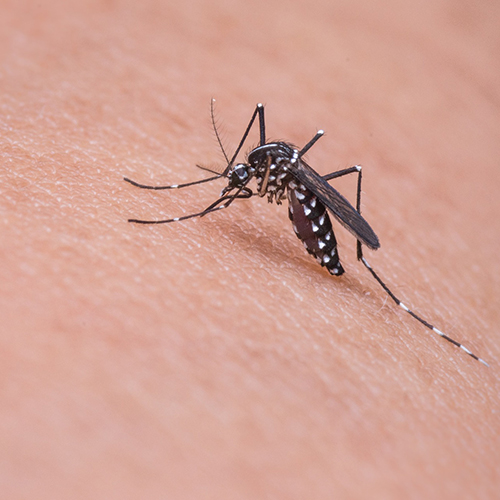31 January 2022
As La Niña continues to deliver wet, humid weather, UniSA scientists are warning that we should be preparing for a monster mosquito season – unwanted by many, but perfectly timed for Australia’s largest mosquito surveillance program, Mozzie Monitors.
A national citizen science initiative created by UniSA’s Professor Craig Williams and currently run by field researcher Stephen Fricker and UniSA PhD candidate Larissa Braz Sousa, Mozzie Monitors involves scientists and members of the community working together to learn more about mosquitoes and mosquito-borne diseases.
Fricker says that the humid conditions current experienced in South Australia and the eastern states are providing perfect conditions for mosquitos to thrive.
“A wet spring and a wetter than usual summer is a sure-fire recipe for a mosquito explosion,” Fricker says. “You may have already noticed an influx of mozzies around the garden, or annoyingly, inside at night. But while the weather conditions remain muggy, people should be prepared for a monster month of mozzies.”
The rising mosquito population coincides with UniSA’s national Mozzie Monitors citizen science project, set to commence on February 14 to track and monitor mosquitos in urban areas.
 Prof Williams says monitoring urban mosquito populations is important because it can provide early warning systems that can help predict and mitigate disease risks.
Prof Williams says monitoring urban mosquito populations is important because it can provide early warning systems that can help predict and mitigate disease risks.
“Millions of people are exposed to mosquito-borne diseases daily, especially dengue virus and malaria,” Prof Williams says.
“In Australia, Ross River fever is common, with mozzie bites spreading the disease among people.
“Evidence suggests that these mosquito-borne diseases could emerge and re-emerge in new areas in the future, due to increasing globalisation, human mobility and climate change.
“As there is no vaccine for the most of these diseases, the most effective way to prevent them still relies on controlling mosquito populations. To do that, it’s crucial to understand the mosquito fauna in each local community and how these populations fluctuate throughout the year.”
The six-week mosquito surveillance project is being led by UniSA PhD candidate Larissa Braz Sousa who says it’s simple for people to get involved.
“People who are interested in the Mozzie Monitors project can get involved in two ways: either by using a simple trap (made from two buckets, one containing water, and adjoined by a net) or via the iNaturalist app,” Braz Sousa says.
“The trap catches female mosquitos who come to lay eggs in the water, but get stuck in the net, enabling citizen scientists to collect and photograph them. And the beauty of this is that you can collect the insects after a few days.
“The app is also easy – it lets citizen scientists photograph and share their observations at any time, so there’s really something to suit everyone.”
Prof Williams says the project is a great opportunity for both young and older people to connect and find meaning through community science.
“Citizen science presents amazing opportunities for people to be curious about the world,” Prof Williams says.
“Projects like Mozzie Monitors enable people to participate in a co-operative and scientific study from the comfort of their own backyards.
“As a family or solo, the beauty of citizen science initiatives is that they allow people to connect – even remotely – through scientific purpose and meaning. Amid COVID-19, this can make a real difference to people who are feeling isolated.
“Who would have thought – pesky (and often painful) mosquitos can bring people together for good!”
To find out more or to register for the 2022 Mozzie Monitors project, please visit: mozziemonitors.com or email the team at: mozziemonitors@unisa.edu.au
……………………………………………………………………………………………………………………
Contacts for interview:
Prof Craig Williams E Craig.Williams@unisa.edu.au
Stephen Fricker E: Stephen.Fricker@unisa.edu.au
Larissa Braz Sousa E: larissa.braz_sousa@mymail.unisa.edu.au
Media contact: Annabel Mansfield M: +61 417 717 504 E: Annabel.Mansfield@unisa.edu.au




